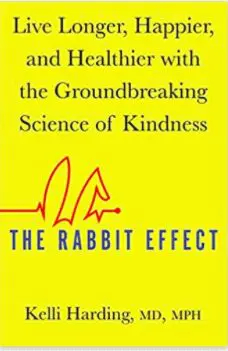by Kelli Harding, MD, MPH (2019 – Atria Books)
Book Review by Joe Casey
Wise and healthy aging is a critical part of retirement, no matter what age you choose to retire at. Daily choices can seem small. But over time they can have a big impact on your health, happiness, and well-being – and on the well-being of those around you. For example, choosing to do acts of kindness can benefit others. And it’s good for you as well. Overall, raising awareness of our choices and their consequences can help us make positive choices and enhance our wellness.
The Mind-Body Connection
Kelli Harding, an MD and MPH is an assistant professor of psychiatry at Columbia University Irving Medical Center and a veteran of the ER at the New York-Presbyterian Hospital. She’s authored an excellent new book on the mind-body connection and the “hidden factors” that influence our health holistically. It will change how you think about health and wellness.
She explains how our individual daily choices either promote or detract from emotional and physical health. But it’s not just about us individually. There’s a two-way street between individual health and collective health. Harding expands the discussion of personal choices to examine the ripple effect on family units, neighborhoods, communities – and ultimately society as a whole. It’s a timely book.
” The data seems crystal clear: It’s time to take socializing as seriously as exercise, diet, and sleep. Study after study builds on the mounting pile of evidence that social support in our community is necessary for wellness.”
– Kelli Harding, The Rabbit Effect
Stress and the Social Component of Health
The fundamentals of wellness are widely known. Eat a healthy diet, get regular exercise and adequate sleep. Dr. Harding highlights another fundamental of good health that’s talked about less often – social connectivity. And the world we live in today creates many obstacles to social connectedness. She points out that many people sometimes seem to be more focused on their devices than on other people. Neighborhoods can be less friendly than perhaps they used to be. And Harding notes that the increase in distrust that’s evolved in recent decades leads to increased fear and perceived threats. Various forms of bias and discrimination can fuel isolation and stress. And the pace of life today generates prolonged stress, which she notes is “in itself an independent risk factor for poor health.”
“How we treat each other as human beings matters deeply for our health.”
– Kelli Harding, The Rabbit Effect
Positive Actions and Practices
Don’t just sit there, do something! Harding provides useful context and noteworthy data points from research, but this is really a book about taking charge of your well-being by taking action. Harding describes a number of positive actions and daily practices that can mitigate stress, promote wellness and foster wise and healthy aging. Therefore, she concludes each chapter with a list of useful recommendations backed by research and/or experience. Notable actions include cultivating a positive mindset, becoming a lifelong learner, and developing your sense of purpose. And a positive attitude really matters. Harding cites a Yale study that found middle-aged and older adults with a positive attitude about aging lived 7.6 years longer than those who did not.
Harding explains the benefits of starting daily practices around mindfulness, meditation, and gratitude. And she draws an interesting distinction between empathy and compassion. She notes that both entail sensing how someone else feels. However, compassion includes taking action to help someone else alleviate what they are feeling.
In conclusion, I’ll highlight a great question that Dr. Harding recommends to remind us to seize opportunities for acts of kindness. It’s a keeper:
“What can I do at this moment that could add kindness to the situation?”
Get The Rabbit Effect on Amazon
Listen In
Listen to our conversation on the Mind-Body Connection with Dr. Kelli Harding on The Retirement Wisdom Podcast
Related Book Reviews
Refire! Don’t Retire by Ken Blanchard and Morton Shaevitz
Check out our full list of Best Books on Retirement here
Related Retirement Podcast
How Can You Be Better with Age?
Related Posts
Book Review by Joe Casey:
Joe Casey is an executive coach and retirement coach with Retirement Wisdom® and co-host of The Retirement Conversation podcast. A former senior HR executive, he’s been quoted in The Wall Street Journal, CNBC.com and Business Insider on career and retirement issues.

